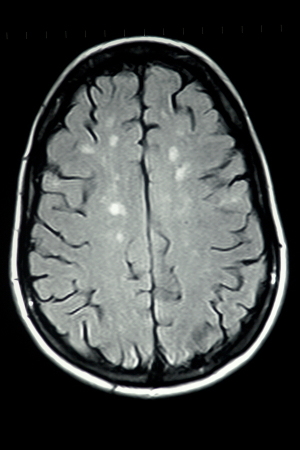by
Lauren Dubinsky, Senior Reporter | February 02, 2016
A new MR technique that may speed up the diagnosis of multiple sclerosis (MS) has been developed by researchers at the University of Nottingham and Nottingham University Hospitals NHS Trust. A study outlining and investigating the technique was recently published in
Multiple Sclerosis Journal.
"MS is traditionally diagnosed based on the combination of symptoms, signs, abnormal MR and many times a lumbar puncture,” Dr. Nikolaos Evangelou, clinical associate professor of neurology at the University of Nottingham, told HCB News. “Usually it is an easy diagnosis to make but a number of studies have recently shown that MS is frequently misdiagnosed and many times wrongly treated, so what we report seems to be very useful to the practicing neurologists.”
Large research MR scanners are able to detect the lesions in the brain’s white matter that are centered on a vein, which is an indicator of MS, but those scanners are not clinically available. The researchers set out to find out whether a single brain scan in an NHS hospital scanner could also effectively distinguish patients with MS and patients with non-MS lesions.



Ad Statistics
Times Displayed: 46241
Times Visited: 1406 MIT labs, experts in Multi-Vendor component level repair of: MRI Coils, RF amplifiers, Gradient Amplifiers Contrast Media Injectors. System repairs, sub-assembly repairs, component level repairs, refurbish/calibrate. info@mitlabsusa.com/+1 (305) 470-8013
The researchers recruited 40 patients from the neurology outpatients’ department of Nottingham University Hospitals NHS Trust. They found that all patients with MS had central veins in over 45 percent of brain lesions, but the rest of the participants had central veins visible in less than 45 percent of lesions.
They also conducted a validation cohort with 20 patients — 13 with MS and seven with other lesions — and found that all of the patients were correctly diagnosed as having MS or non-MS lesions. Notably, the process took less than two minutes per scan.
The findings of this study are important because less than 50 percent of patients referred to MS treatment centers with suspicion of the disease are actually found to have it. That demonstrates that diagnosing MS in a significant minority of cases can be difficult, according to Evangelou.
The research team has initiated a new study that is evaluating patients but they are uncertain if they should extend the study in other U.K. towns. Evangelou is hopeful that in less than two years, they will know if this new test is as accurate as it appears to be.
“We believe that the new method we reported will become an essential requirement before the diagnosis is given,” said Evangelou. “Obviously before that, we and others need to do a few more studies, but so far our findings seem to be holding in many different centers.”
Back to HCB News

